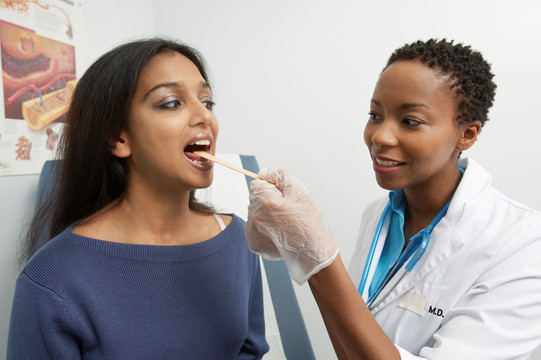Pharyngitis
Pharyngitis refers to inflammation of the pharyngeal mucosa and submucosal lymphoid tissue. It can be acute or chronic and often occurs as part of an upper respiratory tract infection.
Key Points
- Acute pharyngitis is commonly viral but can also be bacterial.
- Chronic pharyngitis results from repeated acute episodes or prolonged exposure to irritants.
- Symptoms include sore throat, dry throat, and difficulty swallowing.
- Management includes addressing the underlying cause, symptomatic relief, and prevention of recurrence.
Etiology and Pathogenesis
- Viral causes: Coxsackievirus, adenovirus, parainfluenza virus.
- Bacterial causes: Streptococci (e.g., Group A beta-hemolytic), staphylococci, pneumococci.
- Environmental factors: Dryness, dust, smoke, exhaust fumes.
- Pathophysiology: Inflammation leads to mucosal congestion, exudate, and lymphocytic infiltration.
Pathological Changes
- Acute pharyngitis:
- Simple: Mucosal congestion, vasodilation, serous exudate.
- Suppurative: Neutrophilic infiltration, yellowish-white exudate on lymphoid follicles.
- Chronic pharyngitis:
- Simple: Mucosal congestion, glandular hyperplasia, increased secretions.
- Hypertrophic: Thickened mucosa, lymphoid hyperplasia, granular protrusions.
- Atrophic: Mucosal atrophy, reduced glandular secretion.
Clinical Features
- Acute pharyngitis:
- Sore throat, dry throat, difficulty swallowing.
- Fever, malaise, and systemic symptoms in bacterial cases.
- Hyperemia and exudate visible on pharyngeal examination.
- Chronic pharyngitis:
- Persistent throat discomfort, dryness, and irritation.
- Thickened or atrophic mucosa on examination.
Diagnosis
- History and physical exam: Duration of symptoms, exposure to irritants, pharyngeal appearance.
- Throat swab: Rapid antigen detection test (RADT) or culture for bacterial causes.
- Blood tests: CBC for leukocytosis in bacterial infections.
Treatment Principles
General Measures
- Rest, hydration, and avoidance of irritants (e.g., tobacco, alcohol).
- Maintain indoor air quality and humidity.
- Regular outdoor exercise to boost immunity.
Medical Management
- Viral pharyngitis:
- Symptomatic relief with analgesics (e.g., paracetamol, ibuprofen).
- Warm saline gargles or throat lozenges.
- Bacterial pharyngitis:
- Antibiotics: Penicillin V 250–500 mg orally 2–3 times daily for 10 days.
- Alternatives for penicillin allergy: cephalosporins, macrolides (e.g., azithromycin).
- Chronic pharyngitis:
- Address underlying causes (e.g., GERD, allergies).
- Topical treatments: throat sprays, saline irrigation.
Prevention
- Avoid smoking, alcohol, and exposure to pollutants.
- Practice good hand hygiene to reduce infection risk.
- Treat underlying conditions (e.g., rhinitis, GERD) to prevent chronicity.
- Regular exercise and balanced nutrition to strengthen immunity.
Complications and Referral
- Complications: Peritonsillar abscess, sepsis (in severe bacterial cases).
- Referral criteria: Refractory symptoms, recurrent infections, or suspected complications.
Patient Education
- Complete prescribed treatments and follow up as advised.
- Use throat lozenges or warm saline gargles for symptomatic relief.
- Seek medical attention for worsening symptoms or signs of complications.







